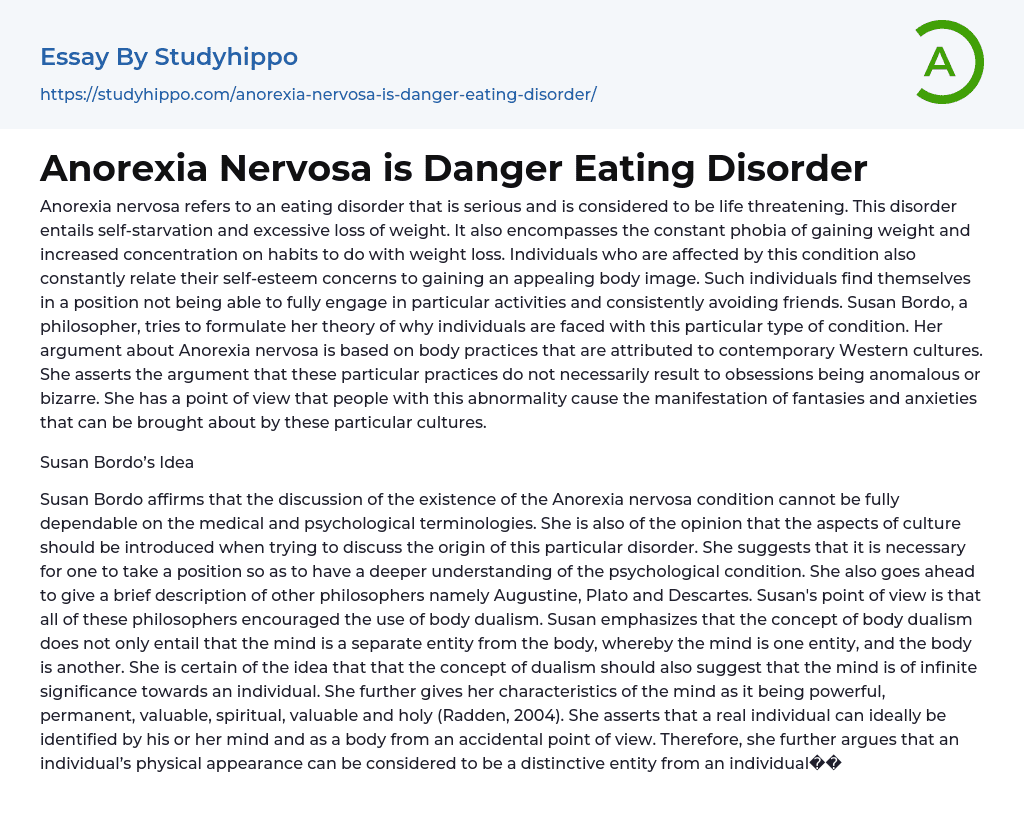Anorexia nervosa refers to an eating disorder that is serious and is considered to be life threatening. This disorder entails self-starvation and excessive loss of weight. It also encompasses the constant phobia of gaining weight and increased concentration on habits to do with weight loss. Individuals who are affected by this condition also constantly relate their self-esteem concerns to gaining an appealing body image. Such individuals find themselves in a position not being able to fully engage in particular activities and consistently avoiding friends. Susan Bordo, a philosopher, tries to formulate her theory of why individuals are faced with this particular type of condition. Her argument about Anorexia nervosa is based on body practices that are attributed to contemporary Western cultures. She asserts the argument that these particular practices do not necessarily result to ob
...sessions being anomalous or bizarre. She has a point of view that people with this abnormality cause the manifestation of fantasies and anxieties that can be brought about by these particular cultures.
Susan Bordo’s Idea
Susan Bordo affirms that the discussion of the existence of the Anorexia nervosa condition cannot be fully dependable on the medical and psychological terminologies. She is also of the opinion that the aspects of culture should be introduced when trying to discuss the origin of this particular disorder. She suggests that it is necessary for one to take a position so as to have a deeper understanding of the psychological condition. She also goes ahead to give a brief description of other philosophers namely Augustine, Plato and Descartes. Susan's point of view is that all of these philosophers encouraged the use of body dualism. Susan emphasizes that the
concept of body dualism does not only entail that the mind is a separate entity from the body, whereby the mind is one entity, and the body is another. She is certain of the idea that that the concept of dualism should also suggest that the mind is of infinite significance towards an individual. She further gives her characteristics of the mind as it being powerful, permanent, valuable, spiritual, valuable and holy (Radden, 2004). She asserts that a real individual can ideally be identified by his or her mind and as a body from an accidental point of view. Therefore, she further argues that an individual’s physical appearance can be considered to be a distinctive entity from an individual’s personhood. She also goes an extra mile to explain that historically, males were fully associated with aspects to do with the mind, which she added entailed logic, knowledge, and reason. Susan also points out that, females, on the contrary, were of the ideology of everything to do with the body. Thus, according to her and as per the dualism model, she indicates that the body and anything that had bodily attributes was considered to be less valuable. Bordo affirms that the Western Society is still being consumed by the ideology of separation of the mind and the body. She is also of the argument that women are highly faced with cultural devaluing. Hence they are considered to be highly sensitive, and mostly attribute to negative impacts (Radden, 2004).
I find Susan Bondo’s argument regarding Anorexia nervosa convincing since she candidly explains why the overdependence of the medical ideology of Anorexia nervosa is not enough to explain the
occurrence of the psychological condition. It is high time we looked at the matter from a broader perspective so as to avoid jumping to conclusions. I also agree with her on the issues to do with the Western body practices that may sometimes trigger this particular ideology. The explanation that women are highly influenced by this ideology of separation of the mind and body is considered to be serious, and it is faced by the increased belief of body devaluation.
Reference
- Radden, J., & Oxford University Press. (2004). The philosophy of psychiatry: A companion. New
York, N.Y: Oxford University Press.




